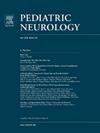Preferred Parental Language and Neurodevelopmental Outcomes Among Infants With Acute Provoked Neonatal Seizures in the United States
IF 3.2
3区 医学
Q2 CLINICAL NEUROLOGY
引用次数: 0
Abstract
Background
Parental non-English language preference (NELP) is associated with worse pediatric health outcomes. However, little is known about its relationship with developmental outcomes in infants with neonatal seizures. This study evaluated the relationship between parental NELP and neurodevelopment in a multicenter cohort of infants with neonatal seizures.
Methods
Infants in the Neonatal Seizure Registry-II were included. Parental NELP was defined by the use of a professional interpreter for research consent and survey completion. The Warner Initial Developmental Evaluation of Adaptive and Functional Skills (WIDEA-FS) assessment was conducted at age 24 months. Multivariate regression was used to examine the association between parental NELP and WIDEA-FS. Functional developmental impairment was defined as a WIDEA-FS score 2 S.D.s below the normative mean.
Results
Among 270 infants with neonatal seizures, 15 (6%) had parental NELP. Children with parental NELP had a WIDEA-FS score that was on average 13 points lower than that of infants without parental NELP (95% confidence interval [CI]: −27 to 1, P = 0.08) and over five times the odds of functional developmental impairment (odds ratio 4.9, 95% CI: 1.3 to 18.4, P = 0.017).
Conclusions
Children with parental NELP were more likely to have functional developmental impairment at age 24 months when compared with children without parental NELP. Since parental NELP does not have a biologically plausible impact on neurodevelopment it likely reflects discriminatory experiences that affect developmental opportunities. These findings highlight the importance of identifying social drivers to decrease potential gaps in neurodevelopmental attainment for children with parental NELP.
美国急性诱发性新生儿癫痫患儿的首选父母语言和神经发育结局
背景:父母非英语语言偏好(NELP)与较差的儿童健康结局相关。然而,它与新生儿癫痫发作婴儿发育结局的关系尚不清楚。本研究在多中心新生儿癫痫患儿队列中评估了父母NELP与神经发育之间的关系。方法:纳入新生儿癫痫发作登记ii期的婴儿。父母NELP的定义是使用专业翻译来同意研究和完成调查。在24个月大时进行适应性和功能性技能的华纳初步发展评估(WIDEA-FS)评估。采用多变量回归分析亲代NELP与WIDEA-FS之间的关系。功能发育障碍定义为WIDEA-FS评分低于标准平均值2个标准差。结果:270例新生儿癫痫发作患儿中,有15例(6%)为亲本NELP。父母有NELP的儿童的WIDEA-FS评分比父母没有NELP的婴儿平均低13分(95%可信区间[CI]: -27至1,P = 0.08),功能发育障碍的几率是其5倍以上(优势比为4.9,95% CI: 1.3至18.4,P = 0.017)。结论:与父母无NELP的儿童相比,父母有NELP的儿童在24月龄时更有可能出现功能发育障碍。由于父母的NELP对神经发育没有生物学上合理的影响,它可能反映了影响发育机会的歧视性经历。这些发现强调了识别社会驱动因素的重要性,以减少父母患有NELP的儿童在神经发育成就方面的潜在差距。
本文章由计算机程序翻译,如有差异,请以英文原文为准。
求助全文
约1分钟内获得全文
求助全文
来源期刊

Pediatric neurology
医学-临床神经学
CiteScore
4.80
自引率
2.60%
发文量
176
审稿时长
78 days
期刊介绍:
Pediatric Neurology publishes timely peer-reviewed clinical and research articles covering all aspects of the developing nervous system.
Pediatric Neurology features up-to-the-minute publication of the latest advances in the diagnosis, management, and treatment of pediatric neurologic disorders. The journal''s editor, E. Steve Roach, in conjunction with the team of Associate Editors, heads an internationally recognized editorial board, ensuring the most authoritative and extensive coverage of the field. Among the topics covered are: epilepsy, mitochondrial diseases, congenital malformations, chromosomopathies, peripheral neuropathies, perinatal and childhood stroke, cerebral palsy, as well as other diseases affecting the developing nervous system.
 求助内容:
求助内容: 应助结果提醒方式:
应助结果提醒方式:


